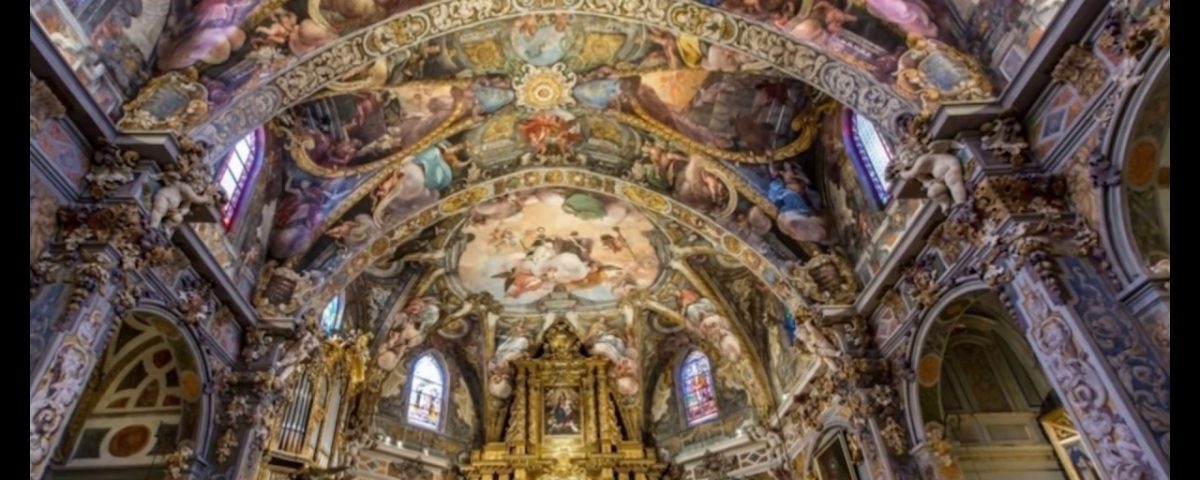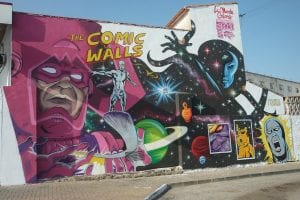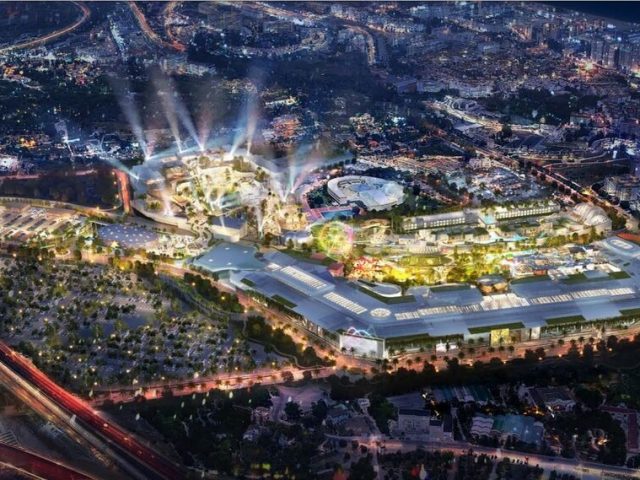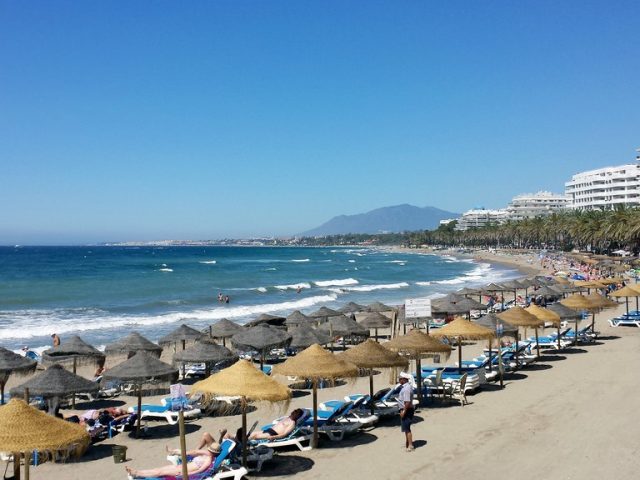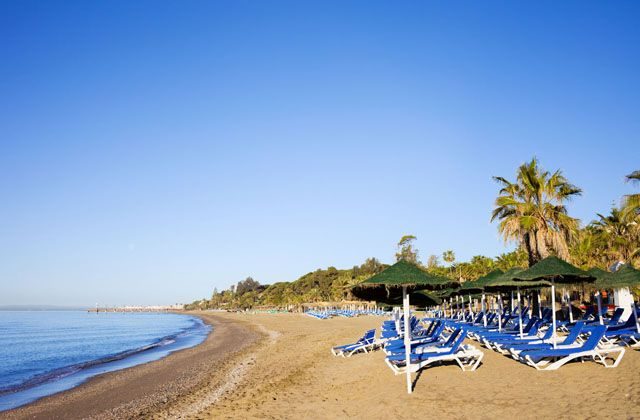- Have any questions?
- +34 951 273 575
- info@allaboutandalucia.com
Fab frescos – an insight to the tradition in Spain

WATCH: New Marbella Arena to host string of ‘international artists’ and events this summer after signing deal with global events company
February 17, 2019
Hacienda Beach in Estepona makes the perfect summer getaway and here’s why
February 19, 2019FROM cave paintings to church frescos to modern murals of epic scale, countless artists have left their brush marks on Spanish architecture down the centuries for visitors to enjoy today. They’re not all frescos in the strictly technical sense but whether classical or street art, some Spanish murals are downright impressive.
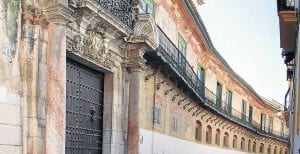 Frying pan masterpieces
Frying pan masterpieces
IT is Spain – and Europe’s – hottest place in summer… and Ecija, in Sevilla, also counts on some of the most beautiful frescos in the country. The ones painted on the Palacio de Penaflor are 60 metres in length and were created by artist Antonio Fernández in 1764.
Estepona’s secret murals
It’s world-famous for its gigantic murals. But recently street art of a more historic nature has been uncovered during restoration work in several corners of the city. This Baroque Banksy – which appears to depict a woman in a crop top and a pomegranate – dates from the 18th century. Found on a house in Calle Mondejar, it has been restored to take its rightful place on the murals walking route.
Frescos of Abdon de Paz
A series of 17th century religious frescos recently discovered by accident when the owners of the house in Abdon de Paz Plaza, Toledo, was doing it up. The whitewashed walls of the traditional patio home hid awesome paintings depicting the parable of the Prodigal Son and other religious scenes. The family renovation project continues, this time with the help of an archeology team.
 Madrid’s Goya dome
Madrid’s Goya dome
The Royal Chapel of San Antonio de Florida boasts a jewel to match its regal name – ceiling and dome frescos by the great Francisco de Goya, painted in 1798. They depict Saint Anthony of Padua raising a man from the dead to free his innocent father from murder charges. They took Goya just six months to complete.
Valencia’s Sistine Chapel
With its 2,000 m2 of domes, columns and soaring arches – double the dimensions of the Vatican – the Church of San Nicolas frescos are a prodigy of baroque art. Completed by Dionis Vidal in the late 17th century, they are so detailed it’s impossible to take it all in. They are divided into two to depict the lives of Saint Nicholas of Valencia and Saint Peter of Verona.
Abbey El Escorial
The historic home of the Spanish monarchs has as many impressive frescos as it has legends. From this colossus reigning over the city of Madrid from its northern hills, King Felipe II could sit in the library and ponder art representing the seven liberal arts: Rhetoric, Logic, Music, Grammar, Arithmetic, Geometry and Astronomy. The majority of the El Escorial frescos were painted by the 16th century Italian sculptor and mural painter Pellegrino Tibaldi.
 Saint Louis of France frescos
Saint Louis of France frescos
Recently restored, the church of San Luis de los Franceses showcases some of the finest examples of Spanish Baroque art in the country. It’s not so famous for its quantity of frescos as for their harmony with the architecture. With ornate artwork rampaging over arches, domes and cupolas, completely disguising supporting pillars, it’s difficult to see where the painting ends and the church begins.
 St. Antony of the Germans fresco frenzy
St. Antony of the Germans fresco frenzy
Founded in Madrid by Felipe IIl at the beginning of the 17th century, the church of San Antonio de los Alemanes is one huge wall-to-wall fresco. It’s also the only church in the region with an elliptic form. Originally built alongside a hospital for Portuguese migrants, it was later rededicated to German immigrants The frescos are by Luca Giordano and Francisco Ricci – the former a prolific Neopolitan court painter renowned for his speed of painting, nicknamed Luca fà-presto (Luca-get-it-done-fast).
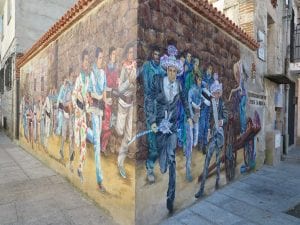 Fresnedillas’ Living Houses
Fresnedillas’ Living Houses
Fresnedillas de la Oliva used to be a ghost village, like many other pueblos in northern Madrid abandoned by their inhabitants for jobs in the city. To encourage people back, the town hall devised the Casas con Vida project to restore the dilapidated village houses. The artist Elena Parlange was commissioned to embellish them and her stunning murals lend a bright new tone to the village.
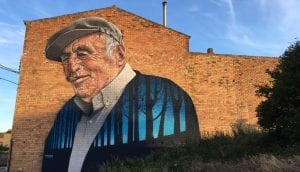 Penelles
Penelles
Art blooms in the most extraordinary places and surprises wait at the turn of every corner in this Lerida (Catalunya) village. Penelles may count only 500 inhabitants but this pint-sized pueblo has become a reference point for street art and painters from all over Europe come here to leave their creations. Many of the murals tell the story of the town and its residents – like El tato and El sison, a native bird from Lerida.
El Provencio’s comic walls
Galactus lives on the walls of El Provencio, Cuenca, along with Silver Surfer, Captain America and other comic book heroes. The origin of these original artworks was the Comic Walls initiative organised during the International Comic Convention. Hosted in July, it attracts fans from all over the country who agree, El Provencio is a comic ‘Marvel’.
Fresco faux pas
 The Ecce Homo in the Zaragoza village of Borja is famous for all the wrong reasons. It was just another of many sacred paintings found across Spain until 2012 when a well-meaning resident decided to do a bit of restoration work, with hilarious results. The Christ figure on the canvas took on a more comic look and became the laughing stock of the Internet. But this previously unknown village is laughing too, all the way to the bank, having welcomed more than 200.000 visitors since.
The Ecce Homo in the Zaragoza village of Borja is famous for all the wrong reasons. It was just another of many sacred paintings found across Spain until 2012 when a well-meaning resident decided to do a bit of restoration work, with hilarious results. The Christ figure on the canvas took on a more comic look and became the laughing stock of the Internet. But this previously unknown village is laughing too, all the way to the bank, having welcomed more than 200.000 visitors since.
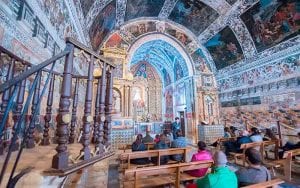 Sistine Chapel of Extremadura
Sistine Chapel of Extremadura
Looks are deceiving … If you came across this modest shrine in Badajoz, you’d never guess it houses a treasure known as the Sistine Chapel of Extremadura. Olive trees and streams surround the Shrine of Virgen del Ara in Fuente del Arco. For a chapel in the middle of nowhere, it’s surprisingly large but the whitewashed walls give no clue to the magnificent polychromic frescos that lie within.

